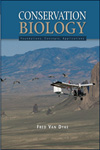 |  Conservation Biology: Foundations, Concepts, Applications Fred Van Dyke
About the Author| Fred Van Dyke is a professor of biology at Wheaton College (Illinois). He received his Ph.D. in environmental and forest biology from the College of Environmental and Forest Biology - State University of New York - Syracuse, and has previously served on the faculties of the Au Sable Institute of Environmental Studies and Northwestern College (Iowa), where he directed Northwestern's program in Environmental Science/Biology.
In his non-academic life, Fred has served as a wildlife biologist for the Montana Department of Fish, Wildlife, and Parks, a cooperative biologist with the U. S. Forest Service, and a consultant to the U. S. National Park Service. His past research efforts have involved the support and cooperation of both government and non-governmental conservation organizations, including the U. S. Fish and Wildlife Service, the U. S. Forest Service, the Rocky Mountain Elk Foundation, and the World Wildlife Fund. Fred is the author of numerous publications on animal home range and habitat use, conservation of animal populations, management of successional processes for habitat conservation and restoration, and conservation values and ethics.
Fred and his wife, Linda, reside in Winfield, Illinois, and are the parents of two daughters, Rachel and Liel. They return to the Intermountain West often, where, in addition to Fred's pursuit of ongoing research interests, they enjoy hiking, fishing, camping, and backpacking.
In the preface of the text, Fred explains why he wrote Conservation Biology: Foundations, Concepts, Applications:
"I believe that conservation biology should be taught as a unity of thought and practice expressed through a coherent foundation of concepts, theories, facts, and values, not as a loose assemblage of impressive disciplinary expertise. A unified textbook of conservation biology does not attempt to present every subject that conservation biologists have studied, but instead defines the context and relationships of controlling ideas, problems, and applications of the discipline."
|
|



 2003 McGraw-Hill Higher Education
2003 McGraw-Hill Higher Education